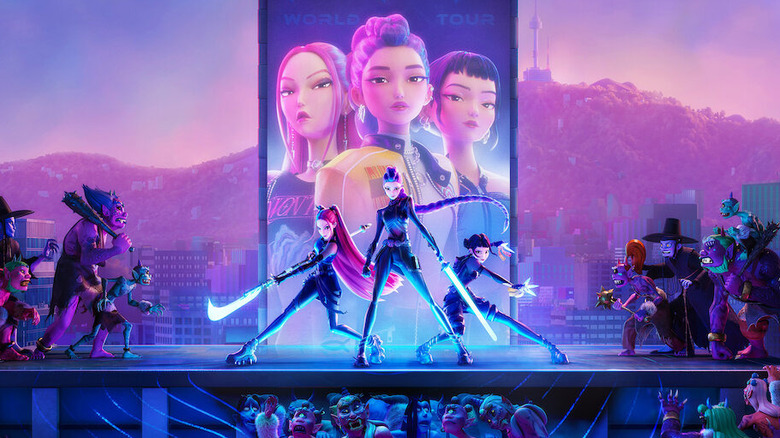KPop Demon Hunters Is A Box Office Hit That Exposes Netflix's Hypocrisy
"KPop Demon Hunters" is now Netflix's most-watched movie of all time, recently overtaking "Red Notice." It's a massive achievement for the animated feature, which has become an outright cultural phenomenon, the sort of which Netflix has hoped to achieve for years. As further evidence of that, the film recently topped the domestic box office with $19.2 million via a two-night only sing-along event. It served as a bit of a victory lap for the streamer. It also exposed the company's frustrating hypocrisy when it comes to theatrical releases.
For years, Netflix has used theaters very sparingly. More often than not, any theatrical run is minimal, short, and largely to secure awards season qualification for prestige pictures like Martin Scorsese's "The Irishman" or Edward Berger's "All Quiet on the Western Front." All the while, co-CEO Ted Sarandos has been crystal clear when it comes to the company's stance on theaters.
"Folks grew up thinking, 'I want to make movies on a gigantic screen and have strangers watch them [and to have them] play in the theater for two months and people cry and sold-out shows," Sarandos said at the Time100 Summit earlier this year (via Variety). "It's an outdated concept."
That's why Netflix won't commit to long theatrical windows. That's partially why the company didn't even officially report grosses for "KPop Demon Hunters." It's also why they recently lost "Stranger Things" creators Matt and Ross Duffer to Paramount. Despite the continued importance of the box office to the overall health of the movie business, Sarandos has been rather staunch in his belief that theaters are outdated. Speaking further at the summit, he elaborated on his feelings:
"What is the consumer trying to tell us? That they'd like to watch movies at home, thank you. The studios and the theaters are duking it out over trying to preserve this 45-day window that is completely out of step with the consumer experience of just loving a movie."
Indeed, theater owners such as AMC Theatres CEO Adam Aron have practically begged Hollywood studios to go back to 45-day exclusive theatrical windows before making big movies available to watch at home on VOD. When it comes to Netflix, AMC is quietly hostile, even refusing to play "KPop Demon Hunters" because of the company's lack of commitment to any level of theatrical exclusivity.
Netflix shouldn't be able to use the box office only when it's convenient
What is frustrating about the success of "KPop Demon Hunters" in theaters is that it allowed Netflix to benefit from this industry that Sarandos is so publicly willing to decry as obsolete. $19 million may be a drop in the bucket for a company that generated $37.5 billion in revenue last year, more than the total global box office combined. All the same, if Netflix truly believes that the box office is obsolete, then why should they ever serve to benefit from it in any way?
"We have these bespoke releases," Sarandos explained at the summit. "We have to do some qualification for the Oscars. They have to run for a little bit; it helps with the press cycle a little bit."
Sure, struggling chains like Regal and Cinemark benefited greatly from "KPop Demon Hunters," and that's why they were willing to carry the movie. Netflix knows that. At the same time, it's maddening that Sarandos can be so candid about their use of the theatrical system as it exists, only when they must, for their benefit. It is not meant to be a mutual exchange. AMC is right not to want to play ball with them.
The situation will only get stickier in the coming months/years. Greta Gerwig's "Narnia" movie is expected to get an IMAX release next year. That's largely to appease Gerwig, who is coming off the insane success of "Barbie." But theater owners aren't happy that Netflix will get precious IMAX screens that could — and probably should — go to another studio's big release that will actually get a more reasonable, exclusive theatrical window.
There's a reason "Glass Onion" star Daniel Craig said Netflix's model is f****d. There's a reason more filmmakers are favoring deals that include theatrical releases. There's a reason theaters are frustrated with Netflix's dismissal of their business, yet they continue to use it when it's advantageous to do so. It's blatant hypocrisy, plain and simple.
Whether or not Netflix should invest further in theatrical distribution is another conversation entirely, but the way things are, it's clear that any benefit they receive under the current system is at best undeserved and at worst an insult to those working to keep the theatrical experience alive.

